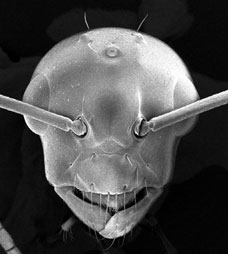 |
MASASHI YOSHIMURA Ph.D.Schlinger Foundation Postdoctoral Fellow Last update July 21, 2009 |
| RESEARCH |
| EDUCATION |
| EXPERIENCE |
| PUBLICATIONS |
| PRESENTATIONS |
| Department of Entomology |
| California Academy of Sciences home |
| Japanese Ant Image Database |
| “ú–{Œê |
Masashi YOSHIMURA Research |

Male-Based Taxonomy of Ants in MadagascarMy research focuses on taxonomy of male ants. Male-based taxonomy of ants offers to provide new insights into their taxonomy, phylogeny, ecology and conservation biology. Specialized characters often found only in male ants make them a substantive source of many new morphological information. For groups of ants difficult to distinguish via female characters, males often provide critical diagnostic characters. In practical terms, observing and analyzing male ants can yield information about colony dispersal strategies and the special role of males in reproduction. Despite the promise offered by male-based ant taxonomy, a number of obstacles have hampered its widespread adoption. Existing information about male taxonomy is scattered among many sources, making taxonomic systematization difficult. Keys and diagnoses of male ants remain scarce and locally limited to just a few geographic regions. And current taxonomic diagnoses for ants are typically based onworker morphologies alone. To establish male-based keys and their diagnoses for a particular region, comprehensive collections of both males and their conspecific workers is required. Most ideally, specimen collections should include the entire ant fauna of a region, but such comprehensive collections are quite rare. The Malagasy ant collection at the California Academy of Sciences is an example of one such almost complete collection. Its comprehensive regional coverage offers the opportunity to address the problems of male-based taxonomy. The collection includes numerous males, most of which are associated with their workers, in a well-organized, databased, and imaged collection that is suitable for analysis using molecular tools. Establishing an identification system for the male ants of the Malagasy region will be an important step toward systematizing taxonomic information of all males. The system will also contribute to conservation biology research in the highly diverse and endemic Malagasy region. |